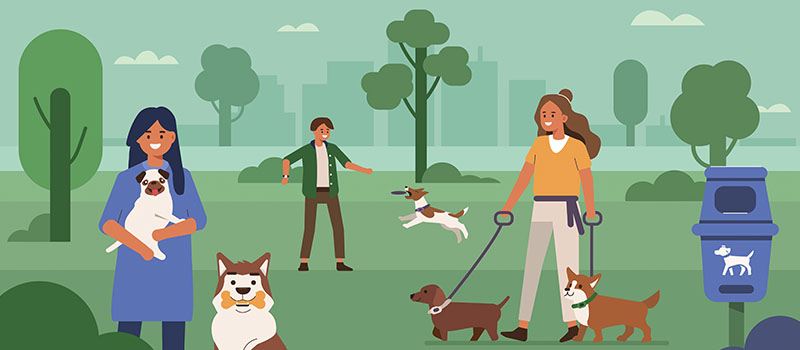What’s the Buzz
The Bee Healthy Blog
What is Kennel Cough in Dogs?

Kennel cough is a canine infectious respiratory disease that is highly contagious. It is easily treatable in most dogs but can cause serious illness in young puppies under 6 months of age, older dogs, and dogs with weakened immune systems. Please continue reading to learn more about kennel cough infection, including the symptoms, treatment, and prevention.
What is kennel cough?
Kennel cough, also called canine infectious tracheobronchitis, is a respiratory tract infection in dogs. It is commonly caused by infectious bacteria called bordetella but can also be caused by other infectious agents, such as the bacterium bordetella bronchiseptica, mycoplasma, canine adenovirus type 2, canine respiratory coronavirus, and canine parainfluenza virus. Older dogs with a canine herpes virus infection can develop a mild inflammation of the nasal passages, which can cause kennel cough.
Why does kennel cough spread at dog parks?
Kennel cough is a highly contagious illness that spreads to healthy dogs from other dogs with kennel cough. It is transmitted through airborne respiratory droplets when an infected dog coughs or sneezes. Kennel cough can also spread through direct contact (for example, by touching noses) and contaminated surfaces and objects (for example, toys or water and food bowls).
There is a higher risk of a dog contracting kennel cough in places where many dogs congregate, for example, dog parks, kennels (doggie daycare or boarding facilities), training groups, canine sporting competitions, and dog shows.
How do dogs get kennel cough at home?
Dogs can get kennel cough at home if they are exposed to airborne droplets released by other dogs that are infected, direct contact with sick dogs, or sharing of contaminated objects.
The usual incubation period for kennel cough is 2-14 days, but some dogs can carry the infection for months without any obvious symptoms. So, if your dog was exposed to any other dog in the past couple of weeks, they might have picked up the infection there.
Other risk factors for kennel cough included prolonged exposure to cold temperatures and irritants like dust or cigarette smoke.
How do you know if your dog has a kennel cough?
Kennel cough symptoms include a severe or forceful cough that makes a characteristic kennel cough sound like a goose honk. The hacking cough can be dry and hoarse or a productive cough with mucus. It can be accompanied by other clinical signs such as a low-grade fever, runny nose, sneezing including sneezing with honking sounds (reverse sneeze), sore throat, post nasal drip, runny eyes, lack of energy, and loss of appetite. In severe cases, more severe signs may be present, such as difficulty breathing.
How to tell the difference between canine infectious tracheobronchitis and canine distemper virus?
It can be hard to tell the difference between canine infectious tracheobronchitis (kennel cough) and serious diseases like canine distemper virus and canine influenza based on symptoms alone. These conditions can cause nearly identical symptoms in the initial stages. Also, asthma, bronchitis, a collapsing trachea, congestive heart failure, and heart disease can cause similar symptoms. That’s why it’s important to consult a veterinarian if your dog is coughing.
What is the fastest way to cure kennel cough?
The best kennel cough treatment is a week or two of rest to allow your dog’s immune system to fight the infection. While your dog recovers, veterinarians recommend you use a harness instead of a collar to prevent irritating your dog’s throat (windpipe) and aggravating the kennel cough.
Can kennel cough go away on its own?
In most dogs, a kennel cough is a natural infection and a mild self-limited illness that goes away on its own without any specific treatment. However, sometimes it's necessary to have your dog’s kennel cough treated. The veterinarian may prescribe antibiotics, nasal mist, or cough suppressants to dogs with kennel cough. This is to stop your dog from coughing and treat active infections or prevent secondary infections.
Nebulizers, vaporizers for inhaled medications (antibiotics or bronchodilators) are not usually prescribed because they aren’t effective.
If you have multiple dogs, kennel cough can spread quickly among your furry friends. Therefore, it may help to keep affected dogs in a separate room.
How to prevent kennel cough in dogs?
There is a vaccine available to prevent kennel cough. It is recommended for dogs who are routinely exposed to many other dogs, such as at daycare or boarding facilities or at dog shows. It comes as an oral vaccine, intranasal vaccine, and injectable vaccine and is usually given in two doses, 2-4 weeks apart, with a booster every 6-12 months. Notably, while the vaccine offers protection against bordetella, it does not protect your dog against other pathogenic organisms that can cause kennel cough.
References:












SOCIAL